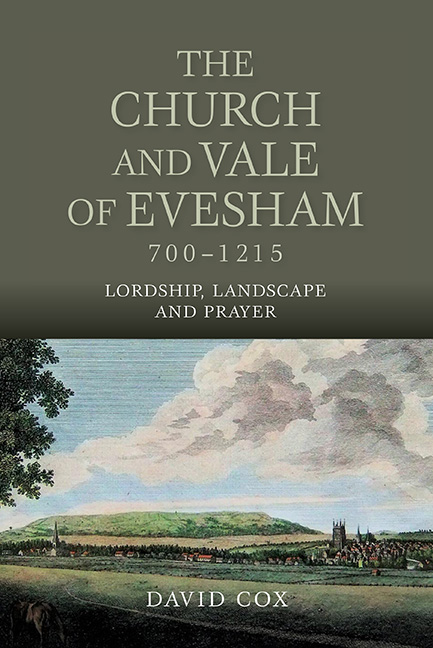Book contents
- Frontmatter
- Dedication
- Contents
- List of Illustrations
- Preface
- Timeline
- List of Abbreviations
- Part I From Minster to Abbey (701–1078)
- Part II Abbot Walter (1078–1104)
- Part III Twelfth-Century Themes (1104–1215)
- Afterword
- Appendix: The Abbots of Evesham to 1215
- Select Bibliography
- Index
- Miscellaneous Endmatter
- Frontmatter
- Dedication
- Contents
- List of Illustrations
- Preface
- Timeline
- List of Abbreviations
- Part I From Minster to Abbey (701–1078)
- Part II Abbot Walter (1078–1104)
- Part III Twelfth-Century Themes (1104–1215)
- Afterword
- Appendix: The Abbots of Evesham to 1215
- Select Bibliography
- Index
- Miscellaneous Endmatter
Summary
IN the last decades of the seventh century Æthelred son of Penda was king of the Mercians, having succeeded his father in the year 675. By armed force King Æthelred had gained control over the south-east of England and the kingdom of Lindsey (part of modern Lincolnshire), and Mercia itself comprised all the Midlands after annexing weaker territories that had once been independent. Politics and war were inseparable. The rapid expansion of Mercian rule had created a realm that in Æthelred's day was culturally and racially diverse. In its western parts British Christians and the followers of other Romano-British cults were continuing to practise, centuries after the end of Roman rule; they had hardly been touched by the intrusive Germanic culture of eastern Britain or by the continental form of Christianity that rulers such as Æthelred were adopting in response to St Augustine's mission of 597 and to the decisions of the Synod of Whitby in 664. And none of the west Mercian territories that Æthelred controlled presented a broader cultural diversity than the former kingdom of the Hwicce. It embraced the lower valleys of two long rivers, the Severn from Wales and its tributary the Avon from the east Midlands, which met and flowed as one to the Severn Estuary. Like the two rivers, the British and the Germanic cultural traditions met within the Hwiccian boundary. The name of the people called Hwicce may in fact have been British1 but by the 690s their territory was governed for Æthelred by a dynasty of under-kings with names that were English, from which it is a fair assumption that the upper layer of Hwiccian society was culturally Germanic while the racial origin of the people was probably for the most part British.
For Æthelred it was a time of spiritual renewal. Penda had believed in the old-established pagan gods that inhabited the Germanic world of his forefathers but Æthelred was a Christian and one of the generation of rulers in England that was experiencing the faith for the first time and encouraging its spread among their peoples. He faced a personal dilemma, however, for he was a Christian by choice but as a king he could not choose also to be a pacifist.
- Type
- Chapter
- Information
- The Church and Vale of Evesham, 700-1215Lordship, Landscape and Prayer, pp. 3 - 13Publisher: Boydell & BrewerPrint publication year: 2015

